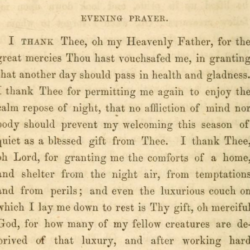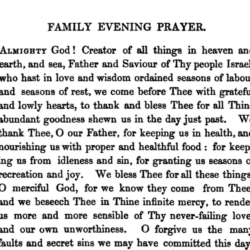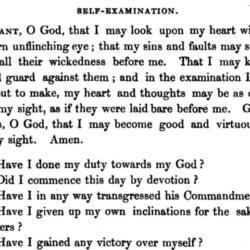TOGGLE COLUMNS (on/off):ADJUST COLUMN POSITIONS: select the column header cell and drag it where you want. show me!COPY INDIVIDUAL COLUMN(S): use CopyTables, a browser extension.
| Contribute a translation | Source (English) |
|---|---|
Prayer before retiring to rest. | |
Sovereign of the universe! Lord of forgiveness and mercy! may it be acceptable in Thy presence, oh Lord my God, to suffer my memorial to ascend before the throne of Thy glory for good. Oh behold my affliction, “for there is no soundness in my flesh, because of Thine anger, nor rest in my bones, because of my sins.” (Psalms 38:5) And now, therefore, oh God of forgiveness, incline Thy tender mercy toward me, and enter not into judgment with Thy servant. | |
And if, before the morning dawns, disease and suffering should take the place of my present health, and life give place to death ere I again leave my bed; if my visitation to death should be near, oh grant, Almighty Father, that with my last breath I may acknowledge Thy unity as it is written in Thy Law: “Hear, oh Israel, the Lord our God is one Lord,” (Deuteronomy 6:4) and that I may die in the faith of my fathers, which I have through life professed and endeavoured to act up to. | |
Remove the terrors of death, and when it comes permit me in Thy mercy to meet it cheerfully and resignedly. Whatever may be the anguish of those moments when soul and body part, let me not murmur nor repine, but think only on the mercies which have been mine through this life, and the glorified happiness of hereafter. Be Thou with me in that awful hour, oh my God. | |
Grant me a lowly repentance, and the blessed assurance I am forgiven, through that mercy which hath been mine so long, that mercy which never faileth. | |
Let me feel Thy Spirit on my soul, oh God, in that last hour, comforting and reviving my dying moments; and let my own conduct, when I am about to die, prove to all around me, how blessed it is to trust in Thee, to call upon Thee in my hours of health and joy. Oh permit me then to prove the agony of death is swallowed up in triumph and in victory. | |
Blessed be the name of the Lord God of Israel, for ever and ever. — Amen. |
“Prayer before retiring to rest” by Grace Aguilar was published posthumously by her mother Sarah Aguilar in Essays and Miscellanies (1853), in the section “Sacred Communings,” pp. 202-203. In the UK edition of Sacred Communings (1853) the prayer appears with small variations of spelling and punctuation on pages 91-92.
Source(s)



“Prayer before retiring to rest, by Grace Aguilar (ca. 1830s)” is shared through the Open Siddur Project with a Creative Commons Public Domain Dedication 1.0 Universal license.
![evening prayer (another day hath passed) [ver. 1] (Grace Aguilar 1853) - cropped](https://opensiddur.org/wp-content/uploads/2023/05/evening-prayer-another-day-hath-passed-ver.-1-Grace-Aguilar-1853-cropped-250x250.png)



![evening prayer (another day hath passed) [ver. 2] (Grace Aguilar 1853) - cropped](https://opensiddur.org/wp-content/uploads/2023/05/evening-prayer-another-day-hath-passed-ver.-2-Grace-Aguilar-1853-cropped-250x250.png)





Comments, Corrections, and Queries